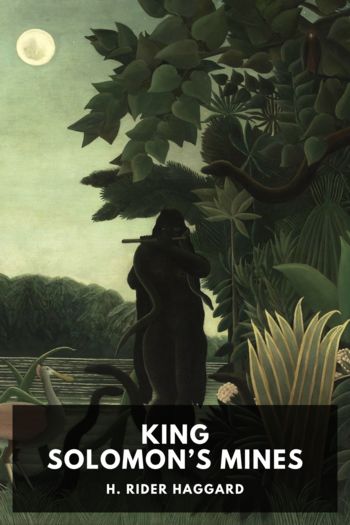The Two Confessions by John Whitbourn (speld decodable readers .TXT) 📗

- Author: John Whitbourn
Book online «The Two Confessions by John Whitbourn (speld decodable readers .TXT) 📗». Author John Whitbourn
Outof nowhere came the shocking idea that these were much, much more ancient than4004 BC, the date Genesis and the Church gave for the creation of the world. Yethow could that be? One or the other notion could be right - but not both.
Likewise,professionally familiar with the developing human frame, Mantell half-glimpseda suggestion of mutating forms therein, one species morphing over eons intoanother. Yet surely that also contradicted tenets of Holy Writ?
Perturbed,somewhat guiltily, he thought on all that evening, sipping at his drink untilMrs Mantell called him to bed. Even then his scandalous ideas would not goaway, though he rather wished they might.
Nextmorning the Doctor was still unsure and, being an honourable Christiangentleman, felt obliged to act upon his doubt. He considered the advisabilityof a privately printed essay; or maybe a lecture to the Lewes 'PhilosophicSociety of St Luke'. It was at least arguable he concluded, that theremight be service to religion in these fossils, and in proving thescriptural account of the Flood. He saw no harm in jotting a few ideas about that.
Intendingonly the most respectful choice of words, that evening Dr Mantell took up hispen and - to the Bogomils' eventual delight - commenced subverting acivilisation.
U[U[U[U[U[U[U
U[U[U[U[U[U[U
THE END (1)
cHAPTER 3
The world might well befinished with Samuel Trevan but his business there proved incomplete just yet.
Melissahad kept Samuel's large collection of 'dragon's bones' to the end, justlike she'd treasured everything of his, even though they no longer met. Butwhen the pneumonia carried her off no one coveted the boxes of dusty old rocks.Her executor, a distant cousin of pious disposition, wanted nothing to do withsuch vaguely blasphemous relicts. Years later he sold them, unpacked andunseen, for a shilling at public auction.
Theywere bought by one Dr Mantell of Lewes, a surgeon and 'natural philosopher' ofenquiring mind. He examined them the very day of purchase, sitting in his studyand pondering the giant teeth and jaws and vertebrae over a glass of port.
Outof nowhere came the shocking idea that these were much, much more ancient than4004 BC, the date Genesis and the Church gave for the creation of the world.Yet how could that be? One or the other notion could be right - but not both.
Likewise,professionally familiar with the developing human frame, Mantell half-glimpseda suggestion of mutating forms therein, one species morphing over eons intoanother. Yet surely that also contradicted tenets of Holy Writ?
Perturbed,somewhat guiltily, he thought on all that evening, sipping at his drink untilMrs Mantell called him to bed. Even then his scandalous ideas would not goaway, though he rather wished they might.
Nextmorning the Doctor was still unsure and, being an honourable Christiangentleman, felt some obligation to act upon his doubt. He considered theadvisability of a private-printed essay; or maybe a lecture to the Lewes 'PhilosophicSociety of St Luke'. It was at least arguable he concluded, that theremight be service to religion in these fossils, and in proving thescriptural account of the Flood. He saw no harm in jotting a few ideas about that.
Finally,after distracted hours of chasing consequences, and likewise pursuing them inprayer, Doctor Mantell carried his problem (as Mother Church advised) to hisconfessor.
Fr.Perry, priest of St Michael's, proved persuasive. He argued the wisdom of notlifting a shroud deliberately draped by God, and of ditching these disquietingremains in the Winterbourne.
Withresidual regret, Mantell complied. On a cold, wet morning early in the thirdmillennium of Man's salvation, he stood and watched that fast flowing streambear the rocks away; taking a certain future - much pleasing to the Bogomils -along with them.
U[U[U[U[U[U[U
U[U[U[U[U[U[U
THE END (2)
cHAPTER 4
The world might well befinished with Samuel Trevan but his business there proved incomplete just yet.
Melissahad kept Samuel's large collection of 'dragon's bones' to the end, justlike she'd treasured everything of his, even though they no longer met. Butwhen the pneumonia carried her off no one coveted the boxes of dusty old rocks.Her executor, a distant cousin of pious disposition, wanted nothing to do withsuch vaguely blasphemous relicts. Years later he sold them, unpacked andunseen, for a shilling at public auction.
Theywere bought by one Dr Mantell of Lewes….
….
U[U[U[U[U[U[U
U[U[U[U[U[U[U
THE END (> ∞)





Comments (0)